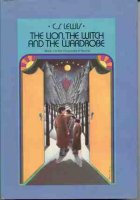
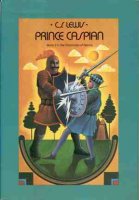
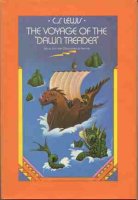
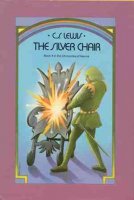
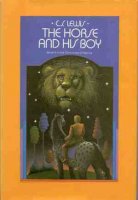
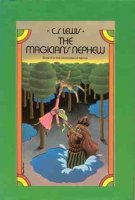
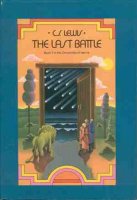
The Lion, the Witch, and the Wardrobe ♦ Prince Caspian ♦ The Voyage of the "Dawn Treader" ♦ The Silver Chair ♦ The Horse and His Boy ♦ The Magician's Nephew ♦ The Last Battle by C. S. Lewis (Macmillan, 1950-1956)
I have elsewhere averred that Lewis's Narnia septet is worth reading annually. Not even the rapid growth of our grandchildren has made me more cognizant of the rapid passage of time than realizing that the last time I read these books was in 2010. That was the year I began keeping a comprehensive record of my reading; without it, I would have been certain it had been no more than a few years since my last reading. Wow.
Their turn came up recently in my C. S. Lewis retrospective, in which I'm reading his books in a rough chronological order. They have always been my favorite of his books, and my discovery of Michael Ward's Planet Narnia enhanced my admiration by an order of magnitude.
One thing I noticed this time around—thanks to my awareness of the chronology of his writing—was the salutory effect the entrance of Joy Davidman into his life appears to have had on his view of women. Lewis's attitude towards women sometimes makes me cringe, but as I've become aware of his biography, I'm amazed he wasn't a total misogynist. His beloved mother died when he was very young, and his subsequent experiences with women were not conducive to developing healthy ideas about normal family life and competent, caring females. Even his relationship with Davidman could hardly be called normal. But she was strong and intelligent, and it's hard not to conclude that the presence in his life of such a woman influenced him to give his female characters more respect as the Narnia series progressed.
That is, if you read them in publication order. I'm 100%, whole-heartedly of the belief that one should read the Narnia books in the order listed above. It is fashionable now to read them in chronological order, supposedly the order Lewis recommended. But if that truly was his recommendation, then I'm bold enough to say he was wrong, even if he is the author. The Horse and His Boy and The Magician's Nephew work very well as flashbacks in the story, much more interesting because of their non-chronological positions in the Chronicles. Scenes in The Magician's Nephew, such as the "planting" of the lamppost, would lose much of their wonder and magic for me if I had not read The Lion, the Witch, and the Wardrobe first. Similarly, I think meetin Aslan for the first time works better in Lion.
This series deserves the highest praise. It's some of the cleverest and most uplifting material I've ever read. I'm sure I would respect it even more if I had better knowledge of Dante, but reading Planet Narnia was eye-opening enough. The only thing that makes me cringe just a bit is that in two of the books the culture of the heroes is clearly modelled on England, while that of the villains is like something out of the Arabian Nights. I think this makes perfect sense for a British author writing for a largely British audience, and since the books were written in the 1950's, this obviously has nothing to do with the current political situation. But it is worth being aware of.
It's been a while since I posted in my Conservationist Living category, which is this post's primary classification, though I've assigned it to several others as well.
America is going to hell, right? Everybody says so. Including a whole lot of people who fervently believe there is no such place as hell, which is an interesting conundrum. But they all believe with equal fervor that we are going there rapidly. Believer or non-believer, left-wing or right-wing, we are convinced that we're in bad shape and on course to get much, much worse. What we disagree on is the attitudes, events, actions, and pathways that are taking us hell-ward.
Believe me, I'm not immune to such pessimism. Neither are you, so I'm going to tell you a small part of the story of Dave Anderson.
The Andersons are friends of our daughter's family, from their Pittsburgh days. Dave's success at building a good life for his family while reclaiming a worn-out strip mine and putting to good use many hundreds of tons of refuse every year was featured last month in this Pittsburgh Post-Gazette article.
I made the 45-minute drive to Echo Valley Farm this week because I wanted to meet the man who’d turned strip-mined land in northwest Beaver County into 26 grassy acres on which beef cattle thrive. Mr. Anderson had told me he revived his land by mixing hundreds of thousands of used paper cups from the Pittsburgh Marathon with manure, hay, banana peels and restaurant refuse.
You'll want to read the whole article to learn about the symbiotic relationship between the farm, needing nourisment, and both private businesses and local governments, needing waste disposal, that's a win for everyone involved.
It all works because there’s something in it for everyone. Mr. Anderson said that 14 years ago, the field over my shoulder produced 6,000 pounds of hay at the first cutting. The cutting in [the] same field last year brought 37,000 pounds.
Plus, the farm is a great place to raise kids.
I ask if it’s just the two of them and he says, no, he and his wife, Elaine, have six girls and a boy. They range in age from 10 to 24. All seven of them comprise Echo Valley, a bluegrass/gospel/Celtic band, that just played in Harrodsburg, Ky., Saturday night.
Several years ago—it was probably more than ten, though I'm finding that hard to believe—we visited the budding farm for one of their many social gatherings of food, music, and fun. Kids and animals were everywhere. The children were much younger then, of course, but they were already solid musicians. Here is a more recent video of the group.
and one of my favorites from earlier, just for fun.
Mr. Anderson, an inveterate reader who doesn’t own a TV, and who also was an air traffic manager until he retired last Friday, figured out how to turn desolate land into a lush farm that supports a family of nine with 30 head of beef cattle, six miniature donkeys, 40 laying hens, two turkeys, four guinea fowl, three geese, three ducks, two Australian cattle dogs and six pups.
Not to mention a number of cats, as I recall.
I hope this brightened your day. If America is, indeed, going to hell, people like the Andersons are pulling mightily in the other direction.
Permalink | Read 1476 times | Comments (4)
Category Politics: [first] [previous] [next] [newest] Children & Family Issues: [first] [previous] [next] [newest] Food: [first] [previous] [next] [newest] Conservationist Living: [first] [previous] [next] [newest] Inspiration: [first] [previous] [next] [newest]
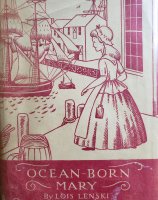 Ocean-Born Mary by Lois Lenski (J. B. Lippincott, 1939)
Ocean-Born Mary by Lois Lenski (J. B. Lippincott, 1939)
I grew up with Lois Lenski's Indian Captive, a fictionalized version of the story of Mary Jemison, captured by Indians during the French and Indian War. She remained with the Senecas all her life, and I have seen her grave in Letchworth State Park, one of our favorite spots in Western New York. It remains one of my favorite stories.
Many years later, after moving to Florida, I discovered the Newberry Award-winning Strawberry Girl, Lenski's novel about rural Florida in the early 20th century, and liked it also.
I wish Lenski's books weren't so hard to find. Recently I discovered a new one, in little Hillsboro, New Hampshire's tiny library: Ocean-Born Mary—and it's as good as the other two.
There's a reason this book is in a New Hampshire library: it is the fictionalized story of Mary Wilson Wallace, who was born on a ship that was part of the 18th century Scots-Irish immigration to New England. She grew up in New Hampshire, and her grave is in Henniker, the next town over from Hillsboro. Our New Hampshire grandchildren will want to be sure to read the Afterward, where they will find such familiar names as The Isles of Shoals and Star Island.
Warning: some spoilers below, but important for parents to read.
I loved Ocean-Born Mary. This is the world many of my ancestors lived in. Lenski has fictionalized the story and softened some of the harsh details for the juvenile audience, but there is great historical detail and it rings true. Written in 1939, it does not have 21st-century sensitivities, and modern parents may cringe at the casual references to "Negro slaves." But that was reality, and it's good for Northerners to realize what they would love to forget—that slavery was not exclusively a Southern sin. It was part of life at that time, as were smallpox and starvation, Indian attacks and British oppression.
Many modern parents may find even more objectionable the protagonist's friendship with an older man of very ill repute, and the fact that she sneaks away on several occasions to meet with him. Nothing untoward happens, and there is nothing at all romantic in the modern sense about the relationship. I've read many modern children's books that are infinitely worse in that dimension. Nonetheless, it may make modern parents queasy, which is why I'd suggest this book as a read-aloud, or that parents might at least read it themselves, first.
But I do recommend Ocean-Born Mary, highly. It's a gripping story, enjoyable to read, and I think it paints a good picture of colonial New England.
When I lamented my love/hate relationship with Penzeys Spices, one of my readers pointed me to an alternative spice source. I wasn't particularly looking for a new source at the time, having resigned myself to making do with grocery store spices except when Penzeys had a very, very special sale—which they seem to do every time Bill Penzey wants to point to a spike in sales as evidence that his customers support a particular political position.
But I checked out The Spice House and was blown away. I had not known the greater Penzeys story: It was Bill Penzey, Sr. who started the original Spice House company. His daughter took over the business, while his son, Bill Penzey, Jr., started his own spice company. Both companies have access to the old family recipes. The Spice House is smaller and more local than Penzeys, which they count to their advantage, all their spices still being prepared by hand in small batches, at their store.
The biggest difference between Penzeys and The Spice House is in politics. For all I know, the owners of the two stores share the same exact political views—or perhaps they are poles apart. I wouldn't know, because, unlike Penzeys, The Spice House makes a point of welcoming customers of all political persuasions, and keeping a very low profile themselves.
Here at The Spice House we are strictly a community of folks who like to cook; you will never get any lectures from us that include our personal agenda. We are just about the love of cooking and getting you the best possible ingredients to produce the most flavorful results!
Penzeys-quality seasonings without the side order of vituperation? I'm in!
My first order with The Spice House was just large enough to qualify for free shipping, because I'm trying to draw down my current spice stockpile, but what I've seen so far, I like very much. Here's a new blend that quickly became a favorite: Lake Shore Drive Seasoning: Gently hand mixed from salt, shallots, garlic, onion, chives, ground green peppercorns, scallions. My favorite alliums all together! I could only be happier if they had—without replacing this one—a blend that included all of the above except the salt, so I could add still more of the flavor to a dish.
I doubt The Spice House will totally replace Penzeys for me, as not all blends are available in both places. But it has certainly become the go-to store for my regular seasoning purchases.
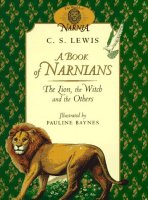 A Book of Narnians: The Lion, the Witch and the Others by C. S. Lewis, text compiled by James Riordan, illustrated by Pauline Baynes (HarperTrophy, 1994)
A Book of Narnians: The Lion, the Witch and the Others by C. S. Lewis, text compiled by James Riordan, illustrated by Pauline Baynes (HarperTrophy, 1994)
When I read a book, it's the words I care about. I confess that I rarely look at illustrations; even when reading picture books to our grandchildren I mostly ignore the pictures. (You can guess how I feel about the "wordless books" that were popular for children at one time.) My view is that if you can't tell a story without illustrations, you're not really telling the story. So much for "a picture is worth a thousand words," at least as far as my reading habits are concerned.
On the other hand, in A Book of Narnians the illustrations are the book, and as far as I'm concerned are the whole worth of the book. Sadly, James Riordan's descriptions of the various Narnian characters, even though taken largely from the books themselves, make me cringe. I'm not certain why, except that—unlike Lewis' words in their original context—they feel condescending, as if someone decided that because this is a picture book, it should be written on a childish level. That's an attitude no intelligent and self-respecting child would put up with.
But it doesn't really matter. The star of the show here is Pauline Baynes' paintings, full color and worth taking time to study. Included as well, to my everlasting delight, is a reproduction of the original published map of Narnia, a poster of which hung for years, alongside a similar map of J. R. R. Tolkien's Middle Earth, in whatever house or dorm room I happened to inhabit.
(The map of Narnia now resides with our daughter, who takes better care of it than I, alas, ever did. I'm sorry to say I don't know what happened to the Middle Earth map, which was just as delightful.)
On November 22, 1963, John F. Kennedy died. I vividly remember a television commentor remarking that 60 people had also died that day in a horrific nursing home fire. In God's eyes, he admitted, those deaths were equally important, "but we are not God."
Death is all around us, every day. Some deaths move us more than others. To some extent, that's as it should be; if your own mother's death isn't more significant to you than the death of a random woman in South Dakota, there's something wrong with either you or your mother. I get that.
What I don't get is what moves the general media, and thus (sadly) the general population, to chose to highlight, amplify, and honor certain deaths for which most people have no personal connection. One child dies in a hurricane, and it's played over and over on the news. More than a dozen children die weekly in auto accidents, and rarely get airplay. Workplace or school shootings arouse great fear and anger, but gang-related violence is mostly ignored. The death of Travon Martin brought intense media attention from all over the world to Central Florida; the concurrent brutal death-and-burning of two young men on a bike trail nearby was all but ignored even by local media.
And then there are ostensibly minor events—like the Sandy Hook shooting, and Orlando's Pulse nightclub attack—which have taken on iconic status, with commemorations that amount to the feast days of some American secular religion.
I do understand that. Human nature, even that of hard-boiled atheists, needs a form of religion, and anything at all can spring into the vacuum created when more traditional forms of faith are abandoned. What I don't understand is why churches buy into it. I'm not even sure why churches celebrate Mother's Day, Veteran's Day, and other secular holidays—much less Super Bowl Sunday, which, no kidding, has been honored at some churches I've been in.
This is no commentary on what my own particular church does or does not do. I am on vacation in a place where the church celebrations are Pentecost and Trinity Sunday; I can't speak for what's going on back home. But if it's like previous years, churches all over Orlando will be talking about the Pulse attack, and tolling their bells 49 times. I don't think that's necessary, or even important. But for those churches who do choose to join in the secular remembrance, I have one plea:
Ring your bell 50 times.
You will hear again and again that 49 people died in the Pulse shooting. But the true number is 50. Any church calling itself by the Name of Christ must acknowledge that the 50th death—that of the attacker—is just as important, and just as tragic, as the other 49. As I wrote a year ago,
The natural way is not the Christian way. It is very, very clear that we are to love our enemies, which at the very least means mourning the violent, if necessary, death of this angry and unstable young man. He, as much as any of the other victims of this tragedy, was someone's son, someone's brother, someone's father, a human being, created in the image of God—no matter how distorted that image had become.
As that commentator acknowledged more than 50 years ago, we are not God. But if we are Christians, we should try to be more like him, and less like the world.
Permalink | Read 1197 times | Comments (1)
Category Random Musings: [first] [previous] [next] [newest]
Variations on this article have been making the rounds on Facebook recently: "Should Arabic numerals be taught in schools? Most Americans say no." Briefly,
CivicScience, whose mission is to power the world’s opinions and bring them to the decision makers who care, asked 3,624 people if schools in America should teach Arabic numerals. By the numbers, 2,020 people said no, 1,043 people said yes and 561 people shared no opinion. In simpler terms, 56% of respondents said no, 29% said yes and 15% chose no opinion.
Perhaps the numeral system’s name exposed a bias among the respondents. Maybe they just didn’t know where our numeral system came from. Both could be true, but CivicScience CEO John Dick is calling it bigotry. “Ladies and Gentlemen: The saddest and funniest testament to American bigotry we’ve ever seen in our data.”
I doubt it.
It's not the apparently negative findings about the American public that worry me, it's that the polling organization is creating polls clearly designed to show Americans to be ignorant and prejudiced. Then, they see what they want to see. For some reason, that sells.
Why is the immediate conclusion that those who rejected the idea of schools teaching Arabic numerals are bigots, and that they are reacting negatively because of the word “Arabic”? I can think of a few reasons off the top of my head that are at least as likely to be true:
- The polls were not set up in a way designed to get an honest, thoughtful response. I’ve seen hundreds, maybe thousands of surveys in my lifetime—and created a few—and I know it’s hard to make one that does not prejudice the data. Surveys designed by those with an axe to grind are particularly egregious.
- People who think our teachers are already overtaxed, people who believe our schools are already being asked to do too much, and people who say schools are not being very successful in what they teach as it is, are automatically choosing “no” to what is presented as if it were something being added to the current educational program.
- People are hearing “Arabic numerals” and thinking “Roman numerals,” which they vaguely remember from elementary school and consider to have been a waste of time and effort. This is the most likely scenario.
- People recognize the question as ridiculous, and are having fun with the pollsters. Don't underestimate this possibility.
It takes little thought and minimal charity to come up with conclusions that treat people with respect. Isn't this what we would want done for us? Why do we immediately assume the worst?
Permalink | Read 1211 times | Comments (0)
Category Random Musings: [first] [previous] [next] [newest]
There's no doubt that video games and manipulating phones and tablets develop certain skills. But if we think all that button pushing and finger-swiping are improving manual dexterity, apparently it's not doing so in ways that still matter greatly—such as the skills needed by a surgeon.
Roger Kneebone, professor of surgical education at Imperial College, London, says young people have so little experience of craft skills that they struggle with anything practical. ... "It is a concern of mine and my scientific colleagues that whereas in the past you could make the assumption that students would leave school able to do certain practical things—cutting things out, making things—that is no longer the case," says Prof Kneebone.
Prof Kneebone says he has seen a decline in the manual dexterity of students over the past decade. ... Students have become "less competent and less confident" in using their hands, he says. ... "We have students who have very high exam grades but lack tactile general knowledge."
Such skills might once have been gained at school or at home, whether in cutting textiles, measuring ingredients, repairing something that's broken, learning woodwork or holding an instrument.
Is this something to be gravely concerned about, or will we simply turn surgery over to robots the way we have turned shifting the gears in our cars over to automatic transmissions?
I have many sins on my conscience, but Evil E-mail Man proved that he was talking through his hat by choosing one that I know beyond the shadow of a doubt I have never committed.
Apparently, "I have a video of you screaming at your kids, and if you don't pay me a bunch of Bitcoin, I'll release it to all of your contacts" is not considered nearly as threatening as "I have a video of you visiting an internet porn site." But at least it would have been credible.
The contrast between our children's high school music experience and our New Hampshire grandchildren's couldn't be greater. The band/chorus/school sizes differ by almost a factor of 10.
If I had to choose one over the other, I don't know which I would prefer. At first glance, I'd have gone with the larger programs hands down. Our Central Florida school opportunites are amazing, with music and theater performances (and equipment/resources) of near-professional quality. Plus the area also has magnet schools and private schools dedicated to the performing arts. The opportunities for serious students of the arts are wonderful here. Not perfect—when we were directly involved, the flaws were obvious—but further experience has shown me how much better off we were than many other places.
But what if you just want to have fun? Or even if you're dedicated to your art, is it better to be in the middle of a great talent pool, or at the top of a small one? I don't think there's an easy answer.
But one thing I do know: One advantage of small town schools is that they're more likely to be flexible, e.g. allowing a fifth grader to be in the seventh grade band, and another student to play in both the middle school and the high school bands. (The elementary, middle, and high schools are all on the same small campus, making the latter possible.)
More to the point of this post, there's room in the spring concert schedule to add a blessing for your grandmother when she makes the 1300-mile journey to hear you play and sing.
This was a total surprise.
Earlier in the year, Jonathan had transcribed Seminole Wind, which I love, from a YouTube video, got together with some of his friends, and arranged it for the group. They played it for their classmates, and I'd had a chance to hear a cell phone recording of that, for which I was very thankful—but the sound quality was not all that great.
How Jonathan managed to persuade the music director to let their group serve as the introduction to the spring concert, I don't know—but Jonathan can be very persuasive and their director is very supportive. Here they are:
If I hadn't been wrangling the camera (which I had gotten out just that minute in preparation for taking a snapshot or two), I would have cried. What a gift!


